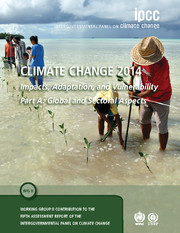 Climate Change 2014 – Impacts, Adaptation and Vulnerability: Part A: Global and Sectoral Aspects
Climate Change 2014 – Impacts, Adaptation and Vulnerability: Part A: Global and Sectoral Aspects Book contents
- Frontmatter
- Contents
- Foreword, Preface, and Dedication
- Summary for Policymakers
- Technical Summary
- Cross-Chapter Boxes
- Chapters 1-20
- Chapter 1 Point of Departure
- Chapter 2 Foundations for Decision Making
- Chapter 3 Freshwater Resources
- Chapter 4 Terrestrial and Inland Water Systems
- Chapter 5 Coastal Systems and Low-Lying Areas
- Chapter 6 Ocean Systems
- Chapter 7 Food Security and Food Production Systems
- Chapter 8 Urban Areas
- Chapter 9 Rural Areas
- Chapter 10 Key Economic Sectors and Services
- Chapter 11 Human Health: Impacts, Adaptation, and Co-Benefits
- Chapter 12 Human Security
- Chapter 13 Livelihoods and Poverty
- Chapter 14 Adaptation Needs and Options
- Chapter 15 Adaptation Planning and Implementation
- Chapter 16 Adaptation Opportunities, Constraints, and Limits
- Chapter 17 Economics of Adaptation
- Chapter 18 Detection and Attribution of Observed Impacts
- Chapter 19 Emergent Risks and Key Vulnerabilities
Chapter 17 - Economics of Adaptation
Published online by Cambridge University Press: 05 January 2015
- Frontmatter
- Contents
- Foreword, Preface, and Dedication
- Summary for Policymakers
- Technical Summary
- Cross-Chapter Boxes
- Chapters 1-20
- Chapter 1 Point of Departure
- Chapter 2 Foundations for Decision Making
- Chapter 3 Freshwater Resources
- Chapter 4 Terrestrial and Inland Water Systems
- Chapter 5 Coastal Systems and Low-Lying Areas
- Chapter 6 Ocean Systems
- Chapter 7 Food Security and Food Production Systems
- Chapter 8 Urban Areas
- Chapter 9 Rural Areas
- Chapter 10 Key Economic Sectors and Services
- Chapter 11 Human Health: Impacts, Adaptation, and Co-Benefits
- Chapter 12 Human Security
- Chapter 13 Livelihoods and Poverty
- Chapter 14 Adaptation Needs and Options
- Chapter 15 Adaptation Planning and Implementation
- Chapter 16 Adaptation Opportunities, Constraints, and Limits
- Chapter 17 Economics of Adaptation
- Chapter 18 Detection and Attribution of Observed Impacts
- Chapter 19 Emergent Risks and Key Vulnerabilities
Summary
17.1. Background
This chapter assesses the literature on the economics of climate change adaptation, building on the Fourth Assessment Report (AR4) and the increasing role that economic considerations are playing in adaptation decision making and policy. AR4 provided a limited assessment of the costs and benefits of adaptation, based on narrow and fragmented sectoral and regional literature (Adger et al., 2007). Substantial advances have been made in the economics of climate change adaptation after AR4.
The specific objectives involved in an adaptation effort can be diverse. One may try to cancel all impacts (negative and positive), maintaining the status quo. Alternatively one can try to cancel adverse impacts and capture positive opportunities, so that the welfare gain (or loss) is maximized (or minimized).
Part of the literature presents adaptation as a continuous, flexible process, based on learning and adjustments (see, e.g., IPCC, 2012). Adaptation projects informed by this approach emphasize learning and experimenting, plus the value of using reversible and adjustable strategies (Berkhout et al., 2006; McGray et al., 2007; Pelling et al., 2007; Leary et al., 2008; Hallegatte, 2009; Hallegatte et al., 2011c).
Adaptation action and policy has also advanced since AR4, and the literature on the economics of adaptation has reflected this. This chapter builds on other chapters in this assessment—in particular Chapter 2, which sets the basis for decision making, recognizing economics as a decision support tool for both public and private actors. The type of economic approach used depends on factors discussed in Chapter 2, among others, including the agent making the decision, the nature or type of decision, the information used to make the decision, who implements the decision, others affected by the outcomes, and the values attached to those outcomes. While realizing the linkages between adaptation and mitigation, the starting point of this chapter is that adaptation is a given need.
- Type
- Chapter
- Information
- Climate Change 2014 – Impacts, Adaptation and Vulnerability: Part A: Global and Sectoral AspectsWorking Group II Contribution to the IPCC Fifth Assessment Report, pp. 945 - 978Publisher: Cambridge University PressPrint publication year: 2014
- 9
- Cited by


